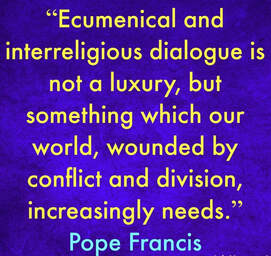|
It is (sadly) interesting to me that, whilst I am a lifelong Anglican, and one with decades of helping lead Anglican teaching and formation, my mother Church tradition rarely asks me to contribute to ways out of its neurotic obsessions with sexuality and gender, whereas others in other spaces do (‘a prophet is not without honour’ and all that?).
Here is a latest offering, with thanks to The Sisters of the Good Samaritan for the opportunity to offer a brief perspective on how flourishing LGBTIQA+ lives flow out core elements of Catholic wisdom down the centuries - not least in considering family, the Body, natural law, the imago dei, and God’s grace in Creation. For: ‘this is about reclaiming Catholic emphases on the centrality of God’s grace in the diverse expressions of creation and incarnation, rather than imposing false ideas of sin and shame on those who are actually gifts to help lead us into greater life together. LGBTIQA+ people of faith do not need welcome, or inclusion, for we are already at home with God, as family members and part of Christ’s Body, wholly natural, and imaging the divine in our diverse ways. What we do need is space to flourish, and thereby we can enable others to flourish also.’ See link to the article iFlourishing Together' in The Good Oil here - or text below...
0 Comments
 an introductory reflection offered to a recent NSW Ecumenical Council discussion by Josephine Inkpin Firstly let me acknowledge country – in particular the land of the Gadigal people of the Eora nation on which I live: their elders past, present and emerging. I also acknowledge all First Nations people here. I do so as right and proper. I also do so as this immediately focuses our discussions. For I live in a suburb (Forest Lodge) named after the house of Ambrose Foss, one of Pitt Street Uniting Church’s distinguished early founders. Next door is the suburb of Glebe: a name also witnessing to Christianity’s role in the dispossession of First Nations peoples. Such naming highlights how so many of our conventional expectations and faith stories are tied up with power. This lies at the heart of many divisions, embedded in our ways of thinking and being. Thanks be for God’s grace, these things are not intractable. Yet, without at least naming them, we will not go far in addressing the polarisation they help cause... a reflection on the journey to genuine 'inclusion' for the Diversity & Inclusion Council of Uniting NSW/ACT
Thank you so much for the opportunity of sharing with you today. Let me first acknowledge the Gadigal peoples of the land from which I speak, and their elders past, present and emerging. I would also like to express my thanks for the work Uniting is already doing in terms of diversity and inclusion, including the vital encouragement this is to myself personally. For genuine visibility of our human diversity is so critical and enriching, as I know from my own experience and the huge number of people who contact me, from all kinds of places. joyfully receiving gifts One of the things I have learned from First Nations peoples is the importance of genuineness of spirit and intent. Back in 1986 in Alice Springs, Pope John Paul II put this well in sharing with Aboriginal and Torres Strait Islander peoples. ‘Until your gifts have been offered’, he said, ‘and joyfully received, the Church in Australia will not be that which Jesus Christ wants to see.’ That challenging truth remains central not only to the Church, but to all parts of Australian life. Until First Nations’ gifts have been fully offered, and joyfully received, with justice, then we will never be the country we can be. That must be the underlying theme of all we do in terms of diversity and inclusion. Yet those words apply more broadly, don’t they? Until the gifts of Asian, Pacific Islander, Middle Eastern, African, LGBTQ+ people, and all kinds of Australians have been offered, and – crucially - ‘joyfully received’, then we will not be what we can be. ‘Joyfully’ is a key adjective. What spirit and intent do we really have? If we approach inclusion mainly as an obligation (politically correct or otherwise), we will have missed the point. For one thing, anyone feels more likely to offer their gifts if there is likely to be a joyful reception. We will never maximise the capacity of any organisation, whether a church, a nation, or Uniting, if we do not joyfully embrace the gifts we are offered. What an opportunity we have as we emerge from, hopefully, the worst of what COVID-19 has done to expose the divisions and distinctions of wealth and power among us in Australia! To build back best, fully, and joyfully, enabling diversity and inclusion is vital. The character of our intent and its spirit is crucial. weak inclusion - as a noun In my experience, ‘inclusion’ can be a very weasel word, covering many continuing sins and PR appearances. Organisations have at least three approaches. The first is what I would call ‘weak’ inclusion. It is better than obvious exclusion but essentially about degrees of permission to belong. It is like a noun: it is somewhat fixed, concerned with quotas and boundaries, but really still involving social distancing rather than engagement. At times and in places, the Uniting Church exercises this kind of inclusion. You can belong as a minority, but are you really honoured, engaged, and joyfully received? That too is where many First Nations people were in Anglican circles in Southern Queensland, including in Anglicare, until we began our Reconciliation Action Plan a few years ago. medium inclusion - as an adjective Secondly, there are ‘medium’ approaches to inclusion. This is what I have experienced in moving into Uniting Church ministry. It involves a genuine welcome, with some affirmation, openness to involvement, and certainly much kindness. Whereas ‘weak’ inclusion is mainly being allowed to the table, this might even include being at the head of the table. Other than Anglo ethnicities, and LGTBQ+ and other networks are also taken with some seriousness. Inclusion becomes more like an adjective than a noun – it is about being inclusive, more dynamic than simply inclusion. It is where the Reconciliation Action Plan was in the Anglican Church Southern Queensland when I left, and maybe, where Uniting is right now. It is, however, only a happier, but not yet fully joyful stage. strong inclusion - as a verb A third stage of inclusion has a deeper spirit and intent. This ’strong’ stage is not about even genuine welcome, but about revealing the gifts of all. It includes affirmation but is really about celebration, led by everyone in our diversity when we are all truly empowered. It is about inclusion as a verb: about active practice day by day; including like Uniting, as a dynamic community of living and belonging. It is also wonderful for any organisation. For we no longer have to work hard at showing we are diverse and inclusive. We demonstrably are. It is our very DNA. Others see it, which also saves many promotional expenses! The Uniting Church aspires to this, and at times manages it. The most visible sign is the Covenant with Uniting Aboriginal & Islander Congress - although, even there, questions remain, including about resourcing and how voices are actually heard and make a difference. Yet the Uniting Church as a whole is not there yet. I sense however that Uniting can move into at least some kind of ‘stronger’ inclusion, where all levels of staff and operations see it as their own work. That is another major shift, but ultimately, as it becomes more natural, it in fact requires less work from advocates and leadership than ‘weak’ and ‘medium’ inclusion – for it belongs to everyone, when everyone truly belongs. True including thus also leads on to expansiveness. sea-change We live in the tag end of some frankly rubbish times, when the very dignity of some human beings has been under question. We have major policies of exclusion in Australia, including towards First Nations claims for justice, towards refugees, some migrants and the poor. Currently, we also have hurtful bills of religious discrimination in federal and state parliaments. Yet my belief is that these are rotten but passing times. I see the journey towards Australian diversity and inclusion as like a sea-change. The waves come in at different speeds. Sometimes they rise high: as with the 1967 Referendum, the Apology to the Stolen Generations, Marriage Equality, and so forth. At times they fade away and we think the tide has gone. Yet it will assuredly return. The key thing is to hold faith and make ready for the next big wave of Australian diversity and inclusion. It will come, and those who are prepared can surf it. Others who do not prepare will flounder. For there is, let’s face it, no vibrant and really sustainable future for Australia without renewing our multicultural identity. Uniting is well placed to seize that time when it comes, if it continues to move more deeply into diversity and inclusion. So, May God bless us all in this exciting journey! |
AuthorJo Inkpin is an Anglican priest serving as Minister of Pitt St Uniting Church in Sydney, a trans woman, theologian & justice activist. These are some of my reflections on life, spirit, and the search for peace, justice & sustainable creation. Archives
July 2024
Categories
All
|

 RSS Feed
RSS Feed